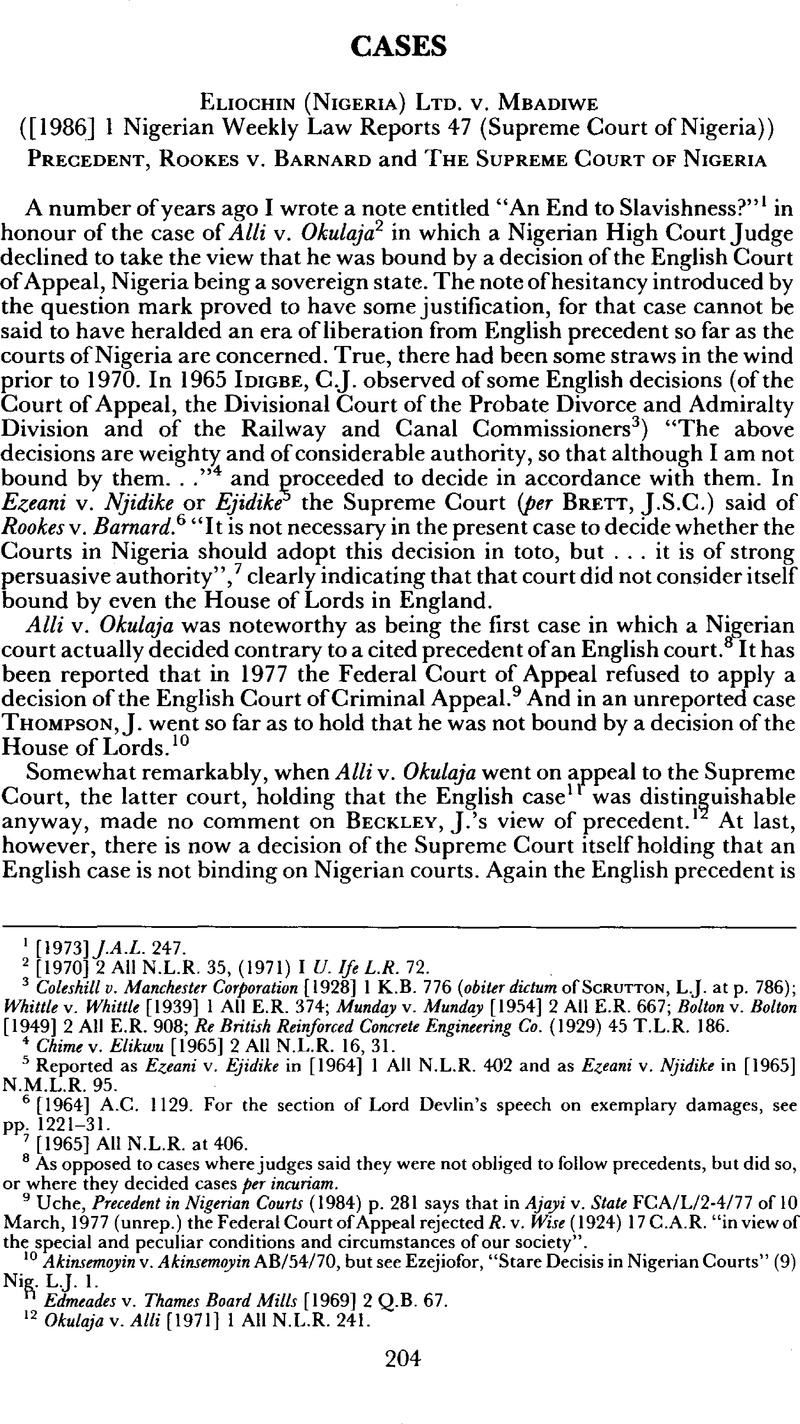Article contents
Abstract

- Type
- Cases
- Information
- Copyright
- Copyright © School of Oriental and African Studies 1986
References
1 [1973] J.A.L. 247.Google Scholar
2 [1970] 2 All N.L.R. 35, (1971) I U. Ife L.R. 72.Google Scholar
3 Coleshill v. Manchester Corporation [1928] 1 K.B. 776 (obiter dictum of Scrutton, L.J. at p. 786)Google Scholar; Whittle v. Whittle [1939] 1 All E.R. 374Google Scholar; Munday v. Munday [1954] 2 All E.R. 667Google Scholar; Bolton v. Bolton [1949] 2 All E.R. 908Google Scholar; Re British Reinforced Concrete Engineering Co. (1929) 45 T.L.R. 186.
4 Chime v. Elikwu [1965] 2 All N.L.R. 16, 31.Google Scholar
5 Reported as Ezeani v. Ejidike in [1964] 1 All N.L.R. 402Google Scholar and as Ezeani v. Njidike in [1965] N.M.L.R. 95.Google Scholar
6 [1964] A.C. 1129. For the section of Lord Devlin's speech on exemplary damages, see pp. 1221–31.
7 [1965] All N.L.R. at 406.Google Scholar
8 As opposed to cases where judges said they were not obliged to follow precedents, but did so, or where they decided cases per incuriam.
9 Uche, , Precedent in Nigerian Courts (1984) p. 281Google Scholar says that in Ajayi v. State FCA/L/2–4/77 of 10 March, 1977 (unrep.) the Federal Court of Appeal rejected R. v. Wise (1924) 17 C.A.R. “in view of the special and peculiar conditions and circumstances of our society”.
10 Akinsemoyin v. Akinsemoyin AB/54/70, but see Ezejiofor, “Stare Decisis in Nigerian Courts” (9) Nig. L.J. 1.
11 Edmeades v. Thames Board Mills [1969] 2 Q.B. 67.Google Scholar
12 Okulaja v. Alli [1971] 1 All N.L.R. 241.Google Scholar
13 See Australian Consolidated Press v. Uren [1969] 1 A.C. 590.Google Scholar
14 [1986] 1 N.W.L.R. 47.
15 The Federal Court of Appeal's decision is reported at [1979] 1 Fed. N.L.R.
16 At 61.
17 At 67.
18 See Johnson v. Lawanson (1971) 1 N.M.L.R. 380 refusing to follow an earlier decision of the Privy Council.Google Scholar
19 See also Uche, , op. cit. above n.9 at p. 280Google Scholar “…the fact that the Privy Council was the ultimate court of appeal and that the latter governed itself by the decisions of the House of Lords on English law persuaded the Nigerian courts that it was sound prudence to follow English decisions up to 1963”. He does not suggest they were necessarily bound to do so, being an adherent of the Allott view that precedents after 1899 are not binding—see below n.24.
20 This would perhaps also weaken the view that all the opinions of the Judicial Committee were binding, not just those from the jurisdiction in question—see, e.g. Uche, , p. 290Google Scholar. Fleming, , Law of Torts 6th ed. p. 563Google Scholar comments on the decision of the Judicial Committee in Uren—“mirabile dictum!”
21 E.g. Interpretation Act s.45(l).
22 Op. cit. at p. 248.Google Scholar
23 E.g. New Essays in African Law (1970) Chap. 2.Google Scholar
24 Sources of Nigerian Law (1963), 63.Google Scholar
25 Machinery of Justice in Nigeria (1963), 21.Google ScholarPubMed
26 The Nigerian Legal System (1979), 134Google Scholar: “Nigerian courts are to apply rules which in their opinion constitute the correct rules of the common law or of equity, not necessarily rules as stated … by any particular English court.”
27 9 N.L.R. 99.
28 Uche, , op. cit. p. 280Google Scholar, seems to imply that Idigbe, Ag. C.J. attached some significance to the fact that the cases were post-1900, but there is nothing in what he himself said to suggest this.
29 It is notable that judges use language suggesting they are bound—e.g. Orojo, C. J. in Lastra Construction Co. (Nigeria) Ltd. v. Attorney-General of Ondo State (1978) 1 L.R.N. 363Google Scholar, 365–quoting from Jaundoo v. Attorney-General of Guyana [1971] A.C. 972Google Scholar (PC) and saying, “The above statement of the law by their Lordships would in my view, apply to the case before me. I therefore hold that the claim for an injunction is, for the same reason, not competent.”
30 At p. 61. Lord Hailsham would disagree: “I view with dismay the doctrine that the common law should differ in different parts of the Commonwealth” Broome v. Cassell Ltd. [1972] A.C. 1027, 1067.Google Scholar
31 [1969] 1 A.C. at 641.Google Scholar
32 See also Taylor v. Beere [1982] 1 N.Z.L.R. 81.Google Scholar
33 Cobbett-Tribe v. Zambian Publishing Co. [1973] Z.L.R. 9,21, approved by the Supreme Court in Times Newspapers v. Kapwepwe [1973] Z.L.R. 292, 301.Google Scholar
34 [1966] L.L.R. 63. In Romeo v. Jumbo PHC/165/76 of 10 02, 1977Google Scholar (Unrep.) the judge awarded damages in excess of the loss caused to the tenant whose landlord had harrassed him by removing the roof—because he discerned a trend among Port Harcourt landlords; however, although Rookes was not cited, it could have been treated as a case of designing to make a profit, since one assumes the landlord hoped to let the premises for more. However, this was not the reasoning relied upon by the learned judge (Allagoa, C.J.).
35 E.g. Garba v. L.C.C. [1974] 3 C.C.H.C.j. 297Google Scholar; exemplary damages were awarded in Konu v. Isiba [1979] 10–12 C.C.H.CJ. 46 on the “profit” ground explicitly.Google Scholar
36 E.g. Adetona v. Drum [1972] N.M.L.R. 4.Google Scholar
37 At p. 67.
38 Ibid.
39 Ibid. An example of the confusion is Nwankwa v. Ajaegba (1978) 2 L.R.N. 230Google Scholar, where the court awarded compensation taking into account the humiliation suffered by the plaintiff, but the editor refers to “exemplary damages” in the ‘key words’.
40 The only case which was actually overruled by Lord Devlin was Loudon v. Ryder [1953] 2 Q.B. 202 (CA).Google Scholar
41 See above n.30.
42 See e.g. Fatayi Williams, C.J.N., in Adesanya v. President of Nigeria 2 Nig. Const. L.R. 358Google Scholar; Attorney-General of Bendel State v. Attorney-General of the Federation 3 Nig. Const. L.R. 1.
- 1
- Cited by


